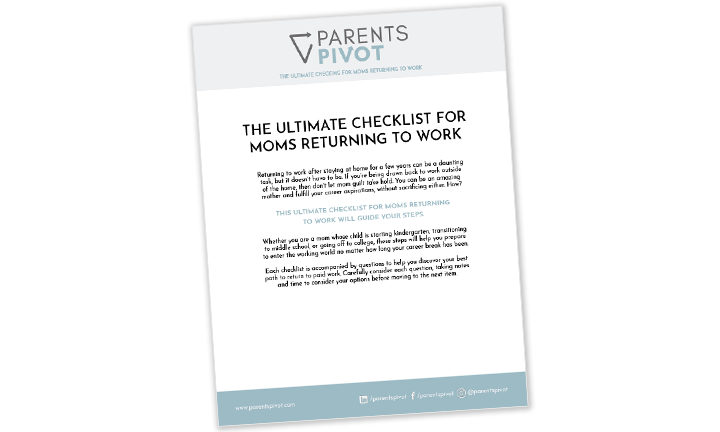“Hi, I’m Anna McKay! I’m hoping to find a job, but I’ve been out of work for 3 years taking care of my kids. I’m just a mom who wants to get back to paid work, but I’m rusty. Do you know of any job openings?”
Worst. Elevator pitch. EVER!
Don’t let a terrible first impression shoot down your chances of securing a job after a career break. If you are a parent who has taken a career pause to care for your children, you can return to paid work with confidence and secure your dream job! A job search elevator pitch is the perfect way to begin.
A job search elevator pitch is designed to let people know that you are looking to re-enter the workforce and what your goals are for returning to work. Below is a simple framework to help you craft a return to work elevator pitch and tips for addressing your career gap.
How Do I Address My Career Break When Returning To Work?
A common fear that parents often have when returning to paid work is if - and how - to talk about their career break. First, yes! A career break is not a bad thing and there are many ways that you can position your break as a positive, rather than a negative.
There are dozens of transferable skills that you are building at home while caring for your children that are valuable in the workplace. Your experience at home is just as impressive as your experience anywhere else – so sell it!
A few examples include: leadership, saying no, budgeting, teamwork, relationships building, research and problem solving, adaptability and agility, strategic thinking, communication, motivation, and organization.
A good elevator pitch provides you with a framework to confidently talk about your career goals without stumbling over the fact that you’ve had a career break.
Framework for A Great Return To Work Elevator Pitch
Your Elevator Pitch should be well thought out and rehearsed. Use the following framework to write out your thoughts and then practice it over and over again until you can say it with confidence without stumbling over your words or saying, “ummm.” The more you practice saying this out loud the more comfortable you will be!
First, introduce Yourself. Begin your elevator pitch with a brief sentence summary of who you are and what your experience is.
“My name is Anna McKay and I have X years of experience in...”
If you are looking to change career fields, you can instead say:
“My name is Anna McKay and I am exploring the field of...” OR “I am taking courses in...”
Outline Your Relevant Skills. After you give your brief introduction, share your relevant skills and value. Make sure you stick to skills that are relevant to your target career by using the above list of transferable skills as a guide to get started. (For even more mom skills that transfer to the workplace, click here.) What professional skills have you connected to? What have you enjoyed doing in your volunteer experience? Be sure to tap into your excitement and passion here so that it’s obvious you are eager to return to work.
Here are a few examples of what this part of your job search elevator pitch might look like:
“During my career pause, I have discovered that I really enjoy raising money for causes that I believe in.”
“Implementing new technology for schools and nonprofits to get them up to date has been so rewarding.”
“Building relationships with team members and motivating them in my role as volunteer chair was one of my favorite parts of that job.”
Share Your Results. After listing your relevant skills, share the real world results of your skills.
“Because of the research that I did around best practices for fundraising for our school gala we were able to increase our fundraising by 20%.”
“As the household budget manager, I’m able to balance 3 kids and their extracurricular activity fees, a healthy meal budget, and fun vacations – all while staying under budget.”
Tease Your Benefits To Employers. Next, it’s important to include a sentence or two about how you will add value and be a benefit to an employer who hires you.
“I know that one of the important aspects of this job is building consensus to get things done. You can’t imagine how hard it is to get consensus on a volunteer board but I did that and know I can do that for you too.”
Finally, end With A Question. To end your elevator pitch strong, ask a question about what you are looking for. Don’t ask if your contact knows of any specific job openings. Instead, ask if your contact knows of any companies doing the kind of work that you want to do in the industry that you want to work in.
“Are you aware of any schools or non profits that want to improve systems and streamline processes?”
Review Your Elevator Pitch. We love this helpful framing from HBR: Your elevator pitch introduction is your current situation. The middle section is your past. The ending is your future where you want to go in your career.
And remember, it’s called an elevator pitch because it should be short enough to say between floors when riding in an elevator. 30-60 seconds at the most!
Take Your Elevator Pitch To The Next Level
If you are still struggling to craft an elevator pitch that truly showcases your value and rolls off the tongue easily, THRIVE Group Coaching is the perfect place for you to hone this job search skill, get feedback from a professional coach and a community of other returners just like you, along with support along many of the other steps in your job search process like getting clear on what you want to do when you return to paid work, creating a resume, interviewing, optimizing LinkedIn, and more that will help you secure a great job.
The next THRIVE cohort starts June 4th. Learn more about THRIVE coaching today!


